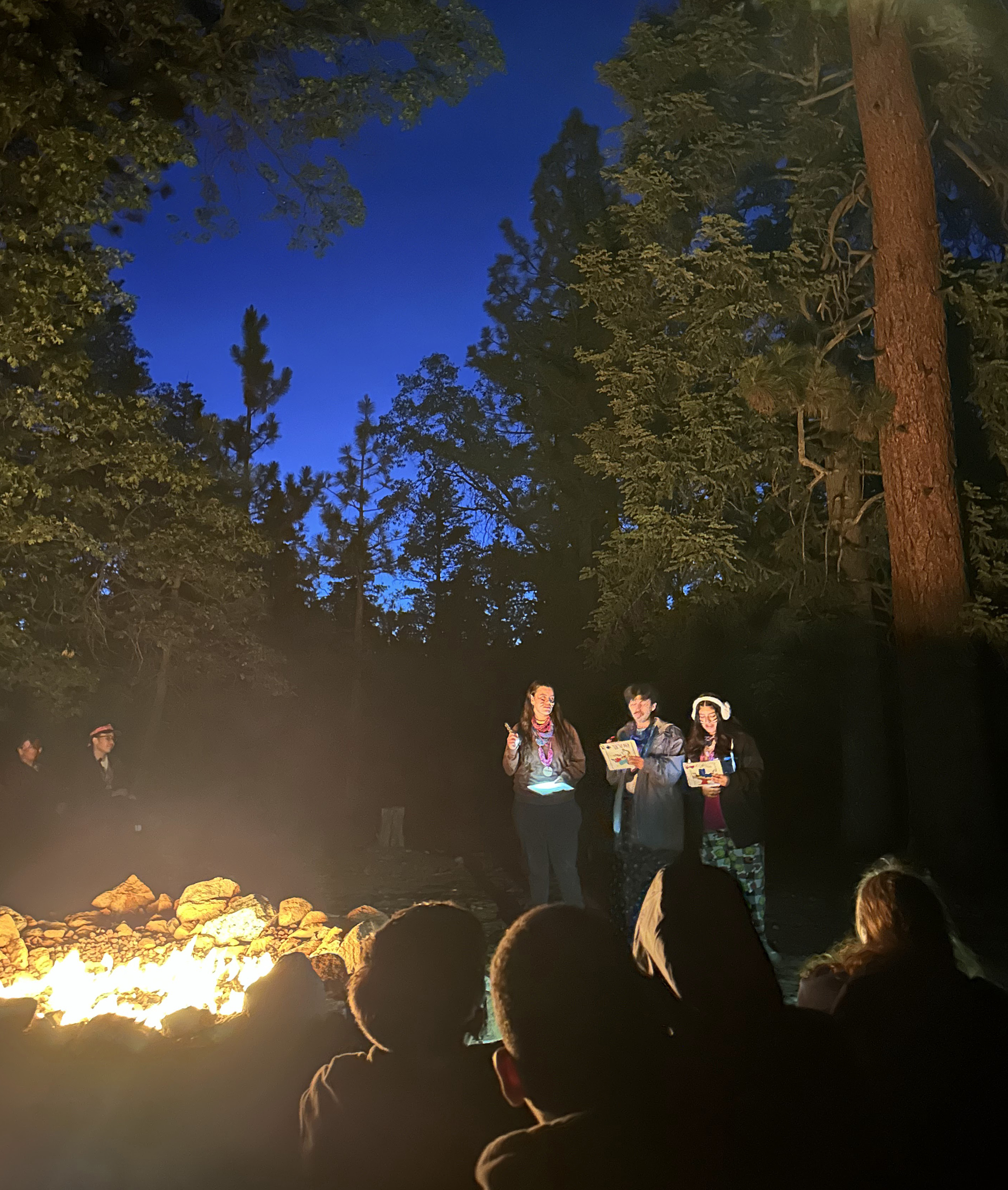For more than 90 years, the University’s signature camp for middle and high school students in Los Angeles has changed lives, one sing-along at a time.
A UCLA tradition since 1934, UniCamp has enhanced the lives of children in Los Angeles as well as the University’s students and alumni for decades. Students aged 10-17 are invited to experience nature and camaraderie, an opportunity not typically available to many growing up in urban settings.
This year, students from UCLA Community School and Horace Mann UCLA Community School took part in UniCamp at Angelus Oaks. Held in six eight-day sessions from late June to early August, the camp is organized into Classic Camp, for ages 10-14, and Older Camper Programs, for ages 15-17, designed to prepare campers to become leaders within UniCamp. Activities include biking, sports such as volleyball and basketball, mountain biking, hiking, games, singalongs, and exploring nature, while bonding as a community with UCLA student volunteers.
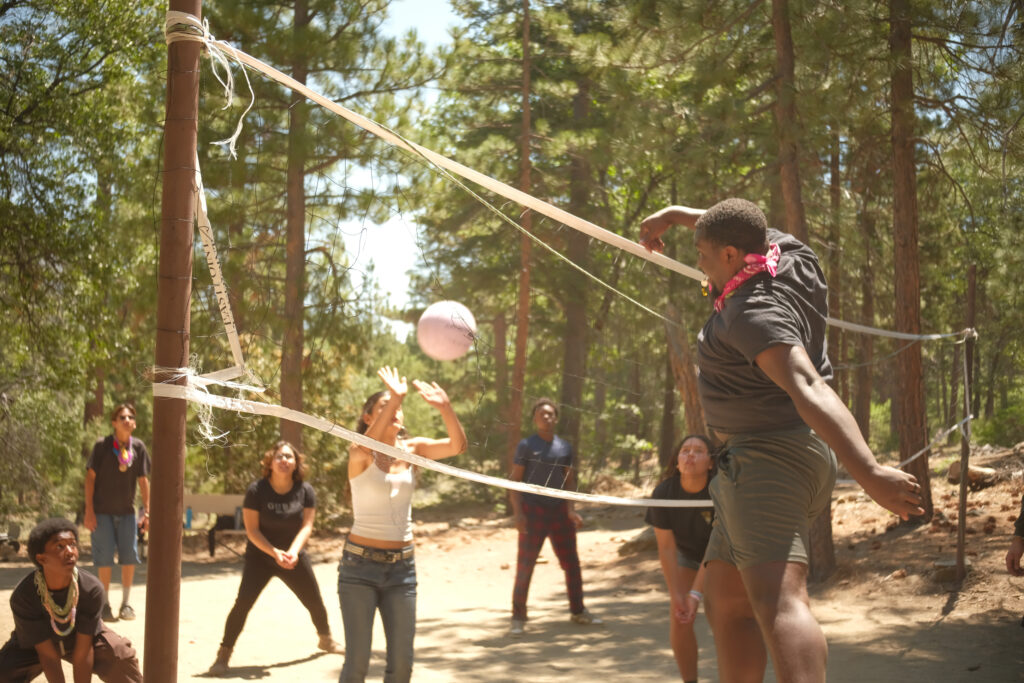
Megan Le (’19, BA, anthropology, minor in digital media, film and TV), director of external relations for Unicamp, and Aaron Delgadillo, (’17, BS, ecology, behavior and evolution; MA, education), a middle and high school science teacher at Mann UCLA, began their Unicamp journey as undergrad volunteers. They share their experiences of this summer’s session and the full circle effect that UniCamp has on its participants, who return to the space for what Le calls, “woodsey magic,” year after year.
What do you think creates this “full circle” effect of Unicamp – that is, what draws former campers back year after year, even to become counselors and staff after college?
Megan Le : One of the things we like to say is, it’s a continuum of care. We start as volunteers or you might even start as a camper. It’s a cycle. As counselors, you learn how to work with kids, inspire the youth, and one day, you hope they will grow to be a counselor and continue that journey of inspiration.
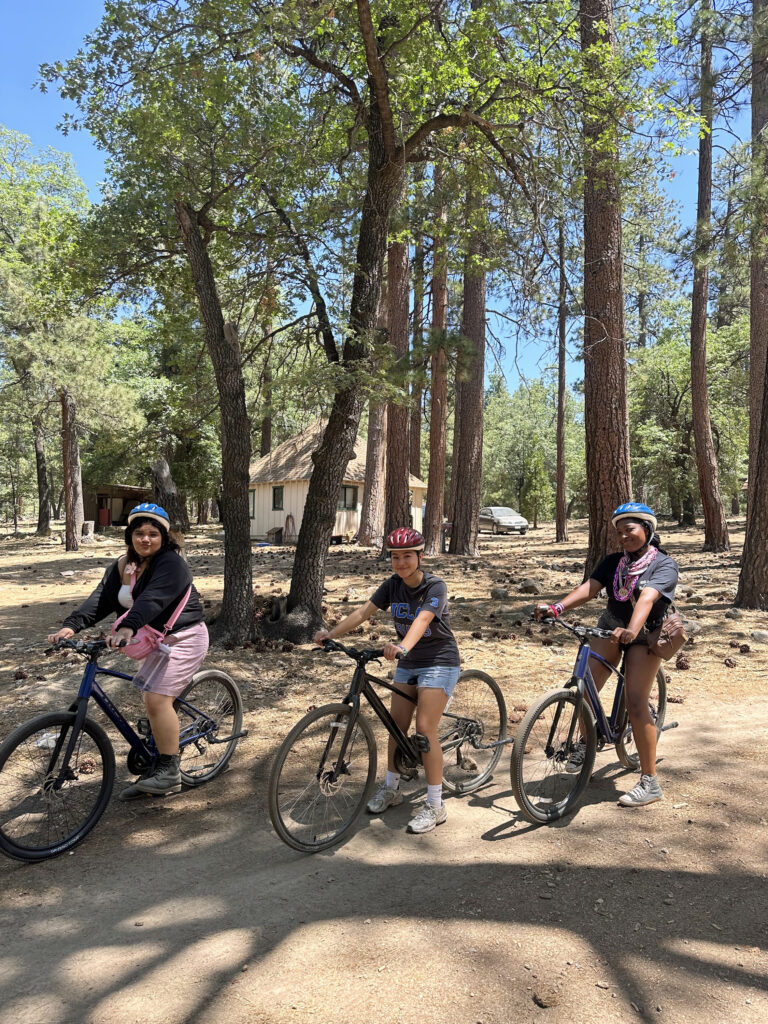
Up at camp, we accept everyone for who they are. The environment and community here is unmatched. A part of it too, is we spend so much time together. As volunteers, we start training in February. We meet once a week for two hours, go on retreats, learn a lot of socialemotional skills, personal skills, people skills. Learning how to connect with one another through this process is what keeps us connected to this organization.
And once you get up to camp, we have a phrase called “woodsey magic” – it’s really hard to describe what it is, and when people ask, we’re like, you just need to go up to camp and experience it for yourself.
There’s an unexplained magic that happens at camp when you’re in the forest with these incredible kids, with these incredible volunteers and staff, that makes you feel like you’re at home, and that you’re cared for. I think we do a great job at that, and we continue to do so. That’s what draws people back to this space.
What is one of the most unique experiences at UniCamp?
Aaron Delgadillo : This is one of the Older Camper Programs – it’s called WALL, which stands for “Wilderness Adventures in Leadership and Learning.” It’s a backpacking trip [for] five adults and the rest are high school students. They get to do one overnight trip [and hike] about 10 miles. They’re carrying 50-pound backpacks [with] their food, their water, their tents, everything to survive for the night. There is a WALL group every session, and they have one or two trips like this every week.
Le : For most of them, they’ve never backpacked before or camped before. They learn a lot of outdoor skills, which is really cool … learning how to pitch a tent, prepare and cook your own food, how to leave no trace. They learn how to take care of our earth and leave it better than [they] found it, and things like that.
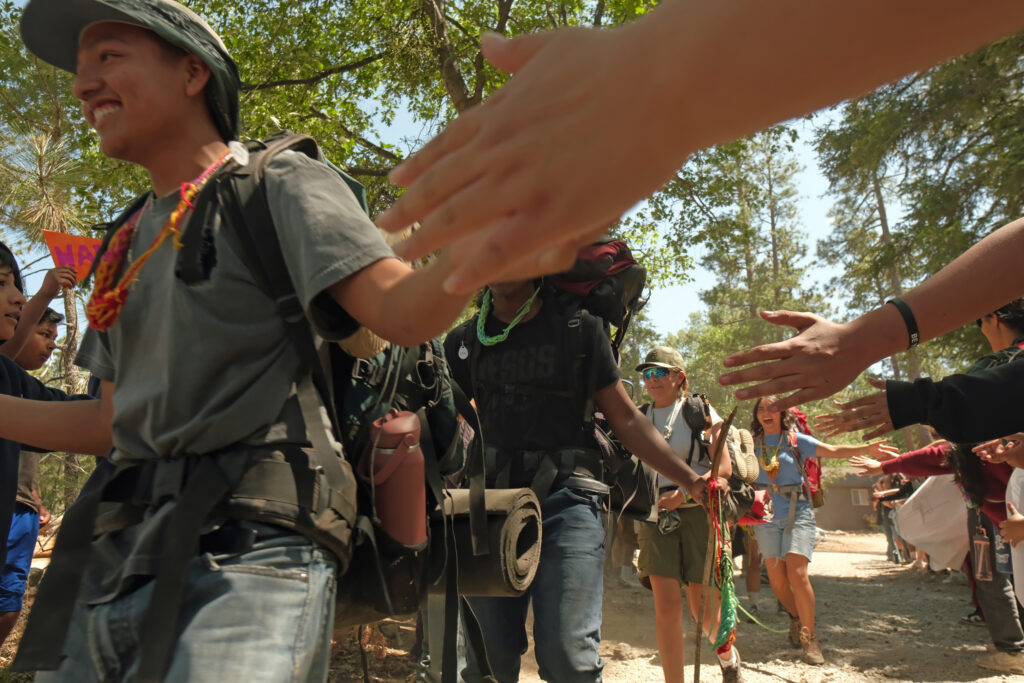
Delgadillo : Spending time and connecting with nature [is] for so many students, their first time going to the mountains, being surrounded by all the bugs, hearing the river – it’s a really special opportunity for them to connect to Planet Earth.
Is there a camp rule about cellphones and devices at UniCamp?
Le : We tell them upfront we have a no-phone, no-electronics policy for campers. They can use their phone on the bus ride up to camp, but once they get up to camp, we collect their devices, store them in a secure place, and they have no access to their phone for the entire week.
I haven’t experienced the first few days with campers without their phones in a while, but from what I remember, it would be a little bit of a challenge. I think without their phone, there’s a lot of feelings and emotions that come up, with frustrations, being homesick, just not having something to connect to, and also being in a new environment where you’re stripped away from the thing that you are on, 24/7 … in a new place.
But, the campers learn really fast that they don’t need their phone for the week. They forget about it. We keep them busy every hour. We have a schedule, making sure they’re engaged and participating, and so, they learn how to live without their phones, and it’s a really cool thing for them to realize. But usually at the end of the week, they’re like, “Can I have my phone back now?” (laughs)
I was sent an idyllic photo of the camp at night, with everyone gathered around the fire. Tell me what is taking place.
Le : On the last night of the week, we gather around the campfires. We tell stories do skits, everybody does skits, and one of the more traditional things we do is tell this hummingbird story.
Delgadillo : It’s this kind of mythology about how the stars came about. There’s this tradition where counselors will ask campers to close their eyes and sprinkle glow sticks all over the ground, as they’re telling a story about a hummingbird who tried hard to poke holes in the night sky and get stars to come down. Then the like glow sticks appear, and all of a sudden all the kids open their eyes, and there’s stars here on Planet Earth with us. It’s the closing activity for every single week. [There are] always oohs and ahhs, and everybody kinda has this warm, fuzzy feeling.
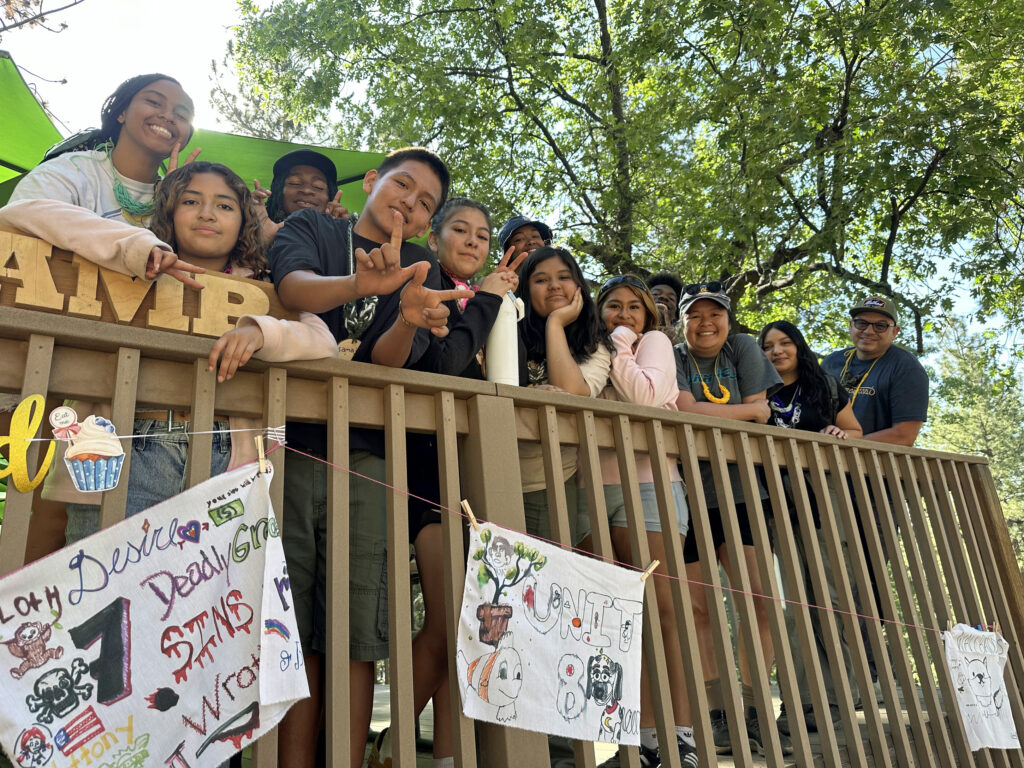
How does UniCamp benefit UCLA students who volunteer as you both did as undergrads, and how does it continue to enhance their lives well beyond their college years?
Le : When we recruit UCLA students or any community members to volunteer, we always let them know that UniCamp is not just for the kids … to grow and have fun. It’s also for the volunteers. As much as we want to watch campers grow and overcome challenges, [for counselors]… there can be a lot of struggles and we are also here to support counselors in their growth journey.

I personally have grown so much through UniCamp. I would not be here if it wasn’t for this organization, and I know Aaron can speak to that, too. It has opened me up so much made me the leader who I am today. When I first joined, I was so painfully shy. I did not talk to anybody. Aaron and I were in the first session together and we did not speak to each other just because there were so many people, but I was also really shy. And so, a lot of my growth I definitely owe to UniCamp. I think a lot of people experience that and they have the urge to want to give back because of how much it’s given to them.
Delgadillo : [Megan] was a first-year college student, and I was a third-year student when we first started volunteering for UniCamp. Word of mouth is how UniCamp spreads. I was told by a co-worker when I was a third-year, kind of pondering what was after graduation – what I was going to do, what I could do to build my resume.
I was thinking about maybe becoming a teacher someday or working outdoors in some capacity. I was a biology major, and UniCamp happened to fall right into my lap. I got a flyer and applied and I feel like since the moment I joined, it really did alter my life path and give me a career, give me all of my friends. Megan and I have been dating for the last four years. We’re actually engaged. We met through UniCamp 10 years ago and then found each other. And now we work together – my school and her job [connect] directly with each other.
Even in my tenth year, I feel at times like it’s challenging to prepare all of the things for everybody to come up to camp, [for] both the counselors and especially the campers. But it ends up being worth it every single summer, and so I think we’ll still be a part of it for a very long time.
There is an alumni program for UniCamp counselors, people who are no longer in college, no longer close to UCLA, where once a week they get to come up on a Saturday and still participate.
We have generations of UniCamp people, still singing songs, playing games, and changing lives. That’s the UniCamp slogan: “Singing Songs, Playing Games, and Changing Lives.” And it really happens just like that. We just come together into the mountains and share wonderful experiences that keep us coming back for more.
To learn more about UCLA UniCamp, visit the website.
Students from Mann UCLA Community School and RFK UCLA Community School have been attending UniCamp for the past 10 years at no cost, thanks to the generous support of private donors.
If you are interested in supporting these students next summer, please donate here.
Photos by Megan Le and Aaron Delgadillo
